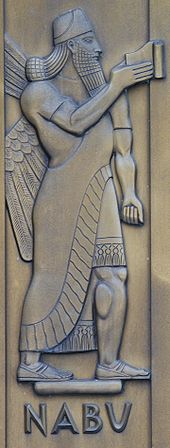Nabu
This article has multiple issues. Please help improve it or discuss these issues on the talk page. (Learn how and when to remove these messages)
|

| Nabu | |
|---|---|
 Statue of the Attendant God from the Temple of Nabu at Nimrud, Mesopotamia on display at the British Museum. | |
| Abode | Borsippa |
| Symbol | Clay tablet and stylus |
| Parents | Marduk and Sarpanitum |
| Consort | Tashmetum and Nissaba |
| Part of a series on |
| Ancient Mesopotamian religion |
|---|
 |
|
|
Nabu (in Biblical Hebrew Nebo נבו[1]) is the Assyrian and Babylonian god of wisdom and writing, worshipped by Babylonians as Marduk and Sarpanitum's son and as Ea's grandson. Nabu's consorts were Tashmetum and Nissaba.
Etymology
Nabu's name is derived from the Semitic root nb´, meaning "to name/designate", "announcer/herald", "the one who is named/designated", "to call", and "to proclaim".[2][3][4]
History
Nabu was originally a West Semitic deity from Ebla whose cult was introduced to Mesopotamia by the Amorites after 2000 BCE.[2][4][5] Nabu was assimilated into Marduk's cult, where he became known as Marduk's minister, Marduk's son with Sarpanitum, and co-regent of the Mesopotamian pantheon.[2][4]
Nabu resided in his temple of Ezida in Borsippa and had several temples devoted to him throughout Assyria, while his cult spread to Egypt and Anatolia due to Aramaic settlers.[2][4][6] Due to his role as Marduk's minister and scribe, Nabu became the god of wisdom and writing,[7][8][9] (including all works of science, religion and magic) taking over the role from the Sumerian goddess Nisaba.[4][10] Nabu became one of the principal gods in Assyria as Assyrians addressed many prayers and inscriptions to Nabu and named children after him.[5]
Nabu was also worshipped as a god of fertility, a god of water, and a god of vegetation.[5][6] He was also the keeper of the Tablets of Destiny, which recorded the fate of mankind[2] and allowed him to increase or diminish the length of human life.[citation needed] His symbols are the clay tablet and stylus.[6]
Nabu's consorts were the Akkadian goddess Tashmetum and the Assyrian Nissaba.[6] He wears a horned cap, and stands with his hands clasped, in the ancient gesture of priesthood.[citation needed] He rides on a winged dragon known as Sirrush which originally belonged to his father Marduk.[citation needed] During the Babylonian New Year Festival, the cult statue of Nabu was transported from Borsippa to Babylon in order to commune with his father Marduk.[citation needed]
In Babylonian astrology, Nabu was identified with the planet Mercury.[2]
Outside of Mesopotamia
In the Bible, Nabu is mentioned as Nebo in Isaiah 46:1 and Jeremiah 48:1.[11][12]
As the god of wisdom and writing, Nabu was identified by the Greeks with Hermes, by the Romans with Mercury, and by the Egyptians with Thoth.[citation needed]
Depictions
A statue of Nabu from Calah, erected during the reign of the Assyrian king Tiglath-pileser III, is on display in the British Museum.[citation needed]
References
| Part of the myth series on Religions of the ancient Near East |
| Pre-Islamic Arabian deities |
|---|
| Arabian deities of other Semitic origins |
- ^ Arie Uittenbogaard for Abarim Publications. "Nebo | The amazing name Nebo: meaning and etymology". Abarim-publications.com. Retrieved 2015-07-02.
- ^ a b c d e f "Ancient Mesopotamian Gods and Goddesses – Nabu (god)". Oracc.museum.upenn.edu. Retrieved 2015-06-23.
- ^ Jeffers, Ann (1996). Magic and Divination in Ancient Palestine and Syria. Leiden: Brill. p. 82. ISBN 9789004105133. Retrieved 1 July 2015.
- ^ a b c d e Leick, Gwendolyn (1998). A Dictionary of Ancient Near Eastern Mythology ([1. pbk. ed.]. ed.). London: Routledge. pp. 123–124. ISBN 0415198119. Retrieved 8 July 2015.
- ^ a b c "Nabu – Myth Encyclopedia – mythology, god, ancient, children". Mythencyclopedia.com. Retrieved 2010-12-24.
- ^ a b c d Editors, The. "Nabu | Babylonian deity". Britannica.com. Retrieved 2015-06-23.
{{cite web}}:|last=has generic name (help) - ^ Rostovtzeff, M. (1926). A History of the Ancient World. [Cheshire, CT]: Biblo Moser. p. 16. ISBN 0819621625. Retrieved 6 July 2015.
- ^ Editors, The (2015-06-25). "Calah | ancient city, Iraq". Britannica.com. Retrieved 2015-07-09.
{{cite web}}:|last=has generic name (help) - ^ "Nimrud: Materialities of Assyrian Knowledge Production - Ezida, the god Nabu's temple of scholarship". Oracc.museum.upenn.edu. Retrieved 2015-07-09.
- ^ "Scribes in ancient Mesopotamia". British Museum. Retrieved 2015-07-06.
- ^ "Isaiah 46:1 NIV – Gods of Babylon – Bel bows down, Nebo". Bible Gateway. Retrieved 2015-06-23.
- ^ "Jeremiah 48:1 NIV - A Message About Moab - Concerning Moab". Bible Gateway. Retrieved 2015-07-02.
External links
This section is empty. You can help by adding to it. (June 2015) |
